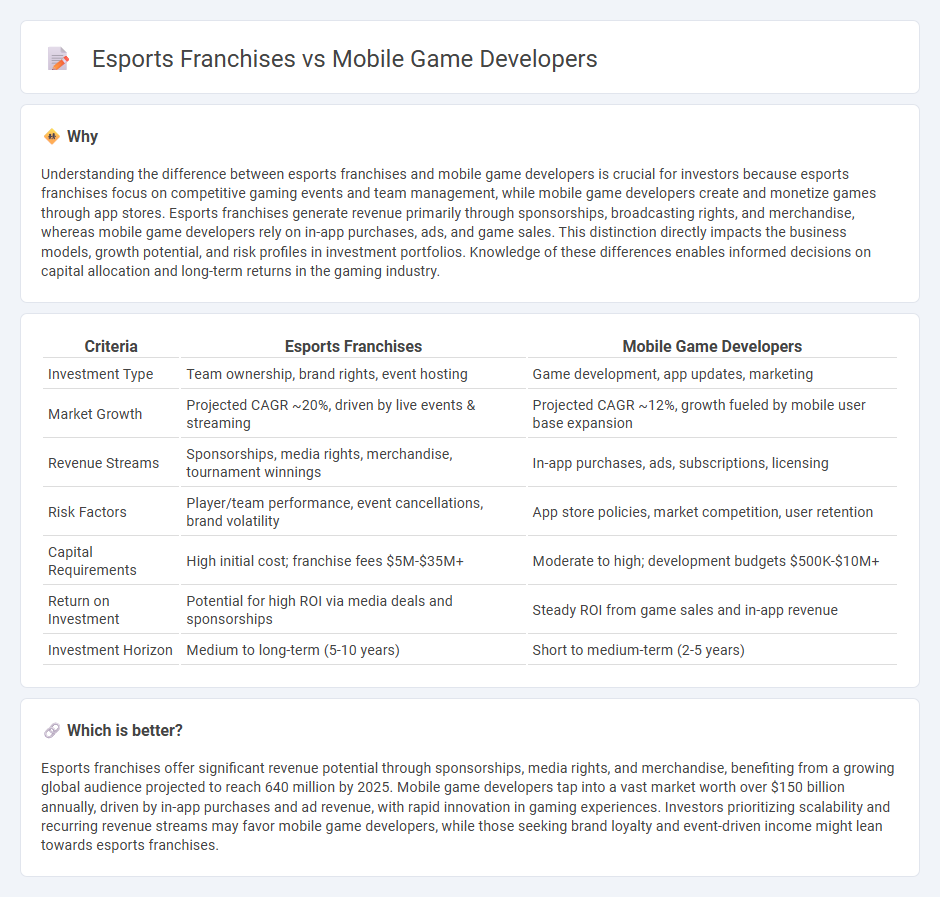
Esports franchises generate substantial revenue through sponsorships, media rights, and merchandise, leveraging large, dedicated audiences in competitive gaming. Mobile game developers focus on monetizing millions of casual players via in-app purchases and ads, capitalizing on widespread smartphone penetration. Explore the distinct investment dynamics shaping the future of competitive and casual gaming sectors.
Why it is important
Understanding the difference between esports franchises and mobile game developers is crucial for investors because esports franchises focus on competitive gaming events and team management, while mobile game developers create and monetize games through app stores. Esports franchises generate revenue primarily through sponsorships, broadcasting rights, and merchandise, whereas mobile game developers rely on in-app purchases, ads, and game sales. This distinction directly impacts the business models, growth potential, and risk profiles in investment portfolios. Knowledge of these differences enables informed decisions on capital allocation and long-term returns in the gaming industry.
Comparison Table
| Criteria | Esports Franchises | Mobile Game Developers |
|---|---|---|
| Investment Type | Team ownership, brand rights, event hosting | Game development, app updates, marketing |
| Market Growth | Projected CAGR ~20%, driven by live events & streaming | Projected CAGR ~12%, growth fueled by mobile user base expansion |
| Revenue Streams | Sponsorships, media rights, merchandise, tournament winnings | In-app purchases, ads, subscriptions, licensing |
| Risk Factors | Player/team performance, event cancellations, brand volatility | App store policies, market competition, user retention |
| Capital Requirements | High initial cost; franchise fees $5M-$35M+ | Moderate to high; development budgets $500K-$10M+ |
| Return on Investment | Potential for high ROI via media deals and sponsorships | Steady ROI from game sales and in-app revenue |
| Investment Horizon | Medium to long-term (5-10 years) | Short to medium-term (2-5 years) |
Which is better?
Esports franchises offer significant revenue potential through sponsorships, media rights, and merchandise, benefiting from a growing global audience projected to reach 640 million by 2025. Mobile game developers tap into a vast market worth over $150 billion annually, driven by in-app purchases and ad revenue, with rapid innovation in gaming experiences. Investors prioritizing scalability and recurring revenue streams may favor mobile game developers, while those seeking brand loyalty and event-driven income might lean towards esports franchises.
Connection
Esports franchises and mobile game developers share a symbiotic relationship driven by the rising popularity of competitive mobile gaming. Mobile game developers invest in esports franchises to enhance brand visibility and foster community engagement through live tournaments and interactive content. This synergy accelerates market growth, increases player retention, and creates lucrative revenue streams across in-app purchases, sponsorships, and media rights.
Key Terms
**Mobile Game Developers:**
Mobile game developers specialize in creating engaging, accessible titles optimized for smartphones, leveraging platform-specific tools and user data to enhance gameplay experience and monetization strategies. Their expertise lies in designing games with scalable graphics, intuitive touch controls, and regular content updates to maintain high user retention rates. Explore the evolving impact of mobile game developers on the rapidly growing mobile gaming and esports markets.
User Acquisition Cost
Mobile game developers strategically optimize User Acquisition Cost (UAC) by deploying targeted ad campaigns and leveraging in-app analytics to enhance player retention and monetization efficiency. Esports franchises face higher UAC due to brand positioning and audience niche, necessitating investments in influencer partnerships and event sponsorships to attract dedicated fans. Discover how these different approaches impact revenue models and growth strategies in the competitive gaming landscape.
Lifetime Value (LTV)
Mobile game developers prioritize Lifetime Value (LTV) by optimizing in-app purchases, retention strategies, and user engagement to maximize revenue per player over time. Esports franchises focus on brand loyalty, merchandise sales, and audience expansion to increase the lifetime value of fans and viewers. Explore detailed strategies and metrics to understand how each domain leverages LTV for sustainable growth.
Source and External Links
The Best Freelance Mobile Game Developers for Hire in July 2025 - Offers access to 27 experienced freelance mobile game developers skilled in Java, C#, Unity Engine, and mobile app/game development for Android and iOS platforms.
19 Top Mobile Game Companies You Should Know 2025 | Built In - Lists leading mobile game companies like EA Mobile, Glu Mobile, Niantic, Nintendo, Zynga, and Activision Blizzard dominating the industry with popular titles and innovative gaming experiences.
Mobile Game Development Company | iOS & Android - Juego Studio - Describes Juego Studios as a top mobile game development company with 300+ experts delivering high-performance games for iPhone and Android, trusted by clients like Amazon, Sony, and Disney.
 dowidth.com
dowidth.com